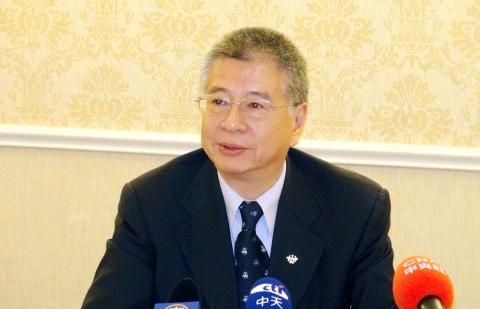Taiwan is developing “asymmetrical strategies” utilizing unconventional capabilities to counter China’s military buildup, Deputy Minister of National Defense Andrew Yang (楊念祖) said at a conference in Richmond, Virginia, on Monday.
In a keynote speech at this year’s US-Taiwan Defense Industry Conference, Yang addressed an emerging China’s impact on Asia-Pacific security, Taiwan’s response and the objectives Taiwan and the US could work on together to maintain peace and stability in the Taiwan Strait.
He described Taiwan’s asymmetrical mindset as one of “David against Goliath” to deal with the growing military imbalance across the Taiwan Strait.

Photo: CNA
“In combination with innovative weapons and defensive countermeasure weapons, Taiwan integrates conventional and unconventional warfare flexibility to create cost-efficient, highly efficient and attainable ‘asymmetric/innovative’ powers,” Yang said.
That way, Taiwan can maximize its advantages to hit the most vulnerable parts of the enemy, sabotage the enemy’s operations and gain mobility, he said.
“This is exactly how size does not matter,” he said.
Yang also stressed that Taiwan cannot produce weapons indigenously for technological or cost reasons and has to buy them from other countries.
“Everything we want to buy is defensive because we need to replace our outdated weapons with new ones, instead of engaging in an arms race,” Yang said.
On reports that the US has decided to offer Taiwan an upgrade to its F-16A/B fleet, but not the more advanced F-16C/D aircraft that Taipei had hoped to acquire, Yang reaffirmed that Taiwan needs the more advanced fighters to replace the air force’s aging F-5E/Fs.
The advanced jet fighters and diesel-electric submarines that Taiwan has also requested both have a direct impact on peace and stability in the Taiwan Strait, Yang said.
He also pledged that Taiwan would never provoke hostilities or launch a first strike, but said that it needed to protect itself and take countermeasures if it came under attack.
Taiwan had to have the ability to survive a first strike, to counter decapitation strikes, initiate mobile counterstrikes and survive prolonged operations, he said.
If an enemy initiated an attack, Taiwan would have to draw on its advantages by employing its defensive countermeasure capabilities to hit key military targets and amphibious troops assembling at ports, he said.
As a battle progressed, Taiwan would place more emphasis on joint interdiction and joint anchorage attacks to stop the enemy from traveling across the Taiwan Strait and delay their arrival in Taiwan, he said.
Also speaking at the conference, Joseph Wu (吳釗燮), a former representative to the US under the previous Democratic Progressive Party administration, said if the US rejected the sale of F-16C/Ds because of pressure from China, it would be even harder for it to sell more sensitive weapons to Taiwan.
Wu, who said the US had been lukewarm to selling new fighters to Taiwan in the past, said it was not a good thing for the F-16C/Ds to become the focus of the international community, because Taiwan’s needs for equipment related to naval and joint warfare operations could be affected.
He said if the US felt caught between Chinese pressure and its obligations under the Taiwan Relations Act, it could provide technological assistance to help Taiwan produce defensive weapons, such as smaller submarines, and build a self-sufficient defense industry.

Chinese spouse and influencer Guan Guan’s (關關) residency permit has been revoked for repeatedly posting pro-China videos that threaten national security, the National Immigration Agency confirmed today. Guan Guan has said many controversial statements in her videos posted to Douyin (抖音), including “the red flag will soon be painted all over Taiwan” and “Taiwan is an inseparable part of China,” and expressing hope for expedited reunification. The agency last year received multiple reports alleging that Guan Guan had advocated for armed reunification. After verifying the reports, the agency last month issued a notice requiring her to appear and explain her actions. Guan

GIVE AND TAKE: Blood demand continues to rise each year, while fewer young donors are available due to the nation’s falling birthrate, a doctor said Blood donors can redeem points earned from donations to obtain limited edition Formosan black bear travel mugs, the Kaohsiung Blood Center said yesterday, as it announced a goal of stocking 20,000 units of blood prior to the Lunar New Year. The last month of the lunar year is National Blood Donation Month, when local centers seek to stockpile blood for use during the Lunar New Year holiday. The blood demand in southern Taiwan — including Tainan and Kaohsiung, as well as Chiayi, Pingtung, Penghu and Taitung counties — is about 2,000 units per day, the center said. The donation campaign aims to boost

A preclearance service to facilitate entry for people traveling to select airports in Japan would be available from Thursday next week to Feb. 25 at Taiwan Taoyuan International Airport, Taoyuan International Airport Corp (TIAC) said on Tuesday. The service was first made available to Taiwanese travelers throughout the winter vacation of 2024 and during the Lunar New Year holiday. In addition to flights to the Japanese cities of Hakodate, Asahikawa, Akita, Sendai, Niigata, Okayama, Takamatsu, Kumamoto and Kagoshima, the service would be available to travelers to Kobe and Oita. The service can be accessed by passengers of 15 flight routes operated by

The Central Weather Administration (CWA) said a magnitude 4.9 earthquake that struck off the coast of eastern Taiwan yesterday was an independent event and part of a stress-adjustment process. The earthquake occurred at 4:47pm, with its epicenter at sea about 45.4km south of Yilan County Hall at a depth of 5.9km, the CWA said. The quake's intensity, which gauges the actual effects of a temblor, was highest in several townships in Yilan and neighboring Hualien County, where it measured 4 on Taiwan's seven-tier intensity scale, the CWA said. Lin Po-yu (林柏佑), a division chief at the CWA's Seismological Center, told a news conference